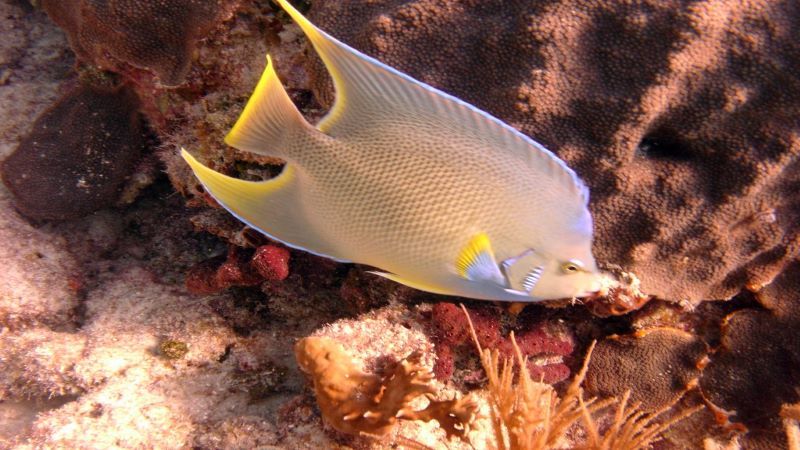Have you ever wondered, “Why are your angelfish not eating?”. Angelfish are picky eaters and can go days without eating. But when they do feed, they go after many foods. It will be a sign of illness when your pet refuses to eat. This article will look at the different reasons why an angelfish do not eat and what you can do to get them to eat as usual. Scroll down now!
Related Articles
- Top 5 Best Flake Food For Angelfish And How To Choose Them | Handy Aquarium Tips
- Best Freshwater Angelfish Food| What Should I Feed Them For Healthy Growth?
- Do Angelfish Eat Snails? 8 Outstanding Features That You May Not Know
- Will Angelfish Eat Shrimp – Top 3 Reasons & How To Prevent This
Why My Angelfish Is Not Eating?
Angelfish, after all, are opportunistic feeders. So, if they can’t locate any plant life to eat, they’ll cheerfully kill and consume a smaller-sized fish.
When these fragile-looking yet violent critters stop eating, fish owners lose their cool. Here are some of the several scenarios in which you could see your aquatic pet go off its meals.
Water Conditions
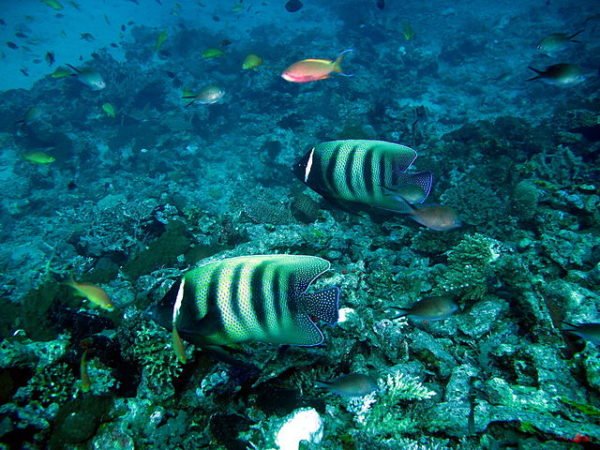
Angelfish aren’t as delicate as they appear. On the other hand, they are extremely sensitive to any chemical changes in the water. Many things can impact any chemical changes that may occur in the water levels. Here are some examples:
- The quantities of nitrate, nitrate, or ammonia will readily and quickly change the chemical composition of the water. If the filter fails, the chemical levels in the water will affect how hungry your pet is.
- When too many dead leaves are present in the aquarium, the water becomes polluted, and the composition of the aquarium changes.
- There will be an increase in ammonia levels in the water if you have too many fish in a tiny fish tank.
- After you have recently cleaned the tank, the theater’s pH level has changed drastically.
- Weather changes can alter the chemical composition of water, limiting your Angelfish diet. As a result, fish owners should keep a close eye on any changes in water levels.
You should check the water’s temperature on a regular basis, but you can also use a water test kit to determine the chemical composition of the water. It will also be simple to resolve your Angelfish not eating problem if you notice significant differences in the chemical levels in the water.
The Variety of Food
Wild angelfish consume a wide range of foods. Because they are omnivores, they eat live prey such as shrimp and other fish. Most aquarium owners, however, just give them flakes and pellets. They eventually weary of eating the same thing every day and quit eating altogether.
According to the Journal of Applied Biological Sciences, Angelfish like meat because they require high protein levels. As a result, integrating worms and insects into your angelfish diet delivers sophisticated nutrition as well as cerebral stimulation.
Similarly, try introducing veggies like zucchini, peas, and cucumber to keep your angelfish interested in food and eating. As a general rule:
- Feed 60-70 percent of basic food, such as flakes and pellets.
- Other items, such as meat and vegetables, should account for 30% to 40% of the diet.
Overfeed
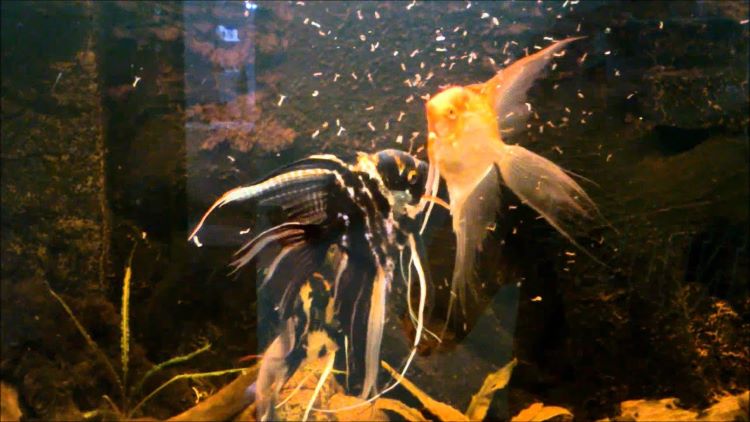
Angelfish eat whenever they can and rarely turn down food. However, if you feed them too much too often, they’ll naturally stop eating since they’re already full.
The general norm is to provide two meals every day. Provide them with food that they can complete in 2-3 minutes. Any more than that, and your fish may lose interest in eating. The least detrimental outcome of overfeeding is your angelfish repelling the food.
Overfeeding might cause your fish to become chubby. And as you may know, fat fish will not reach their full-size potential and may have stunted growth. As a result, their longevity may be significantly reduced.
When your pet stops eating, there will be more leftover food in the tank to contaminate it. And don’t forget that more food means more feces. This will significantly contaminate the water.
Nutritional Deficiencies
Fish can suffer from vitamin shortages. A vitamin deficit implies that your Angelfish will not only be unable to feed; it may also endure stunted or incorrect growth, a weaker immune system, or death.
Your Angelfish need a range of vitamins, including:
- Vitamin A is found in greens and crustaceans and is essential for the development and the appropriate creation of bones and scales.
- Vitamin B: from vegetables and fish — appropriate protein digestion, regular neurological system activity, slime coat protection
- Vitamin C: from greens and algae — illness prevention, healing, digestion, and skeleton construction.
- Vitamin D: obtained from earthworms and shrimps – required for calcium and phosphorus metabolism.
- Greens include vitamin K, which aids in blood clotting.
For Angelfish that have been without food for a few days, it is strongly recommended to speak with a veterinarian and have them obtain the nutrients they need to regain their appetite.
Diseases
When your Angelfish isn’t eating, it could be that he or she is sick. Are my Angelfish unwell? You might wonder. If you want to ensure that your pet fish is truly ill, look for other signs, including sluggishness, ulcers, discolored gills, or white patches. When fish are unwell, they may not even swim properly.
If your fish appears to be unhealthy, the first thing you should do is put it in quarantine. Then call the veterinarian and schedule an appointment. Meanwhile, you may add salt to the water in your aquarium to help remove parasites and bacteria common in fish tanks.
The Change Of Territory
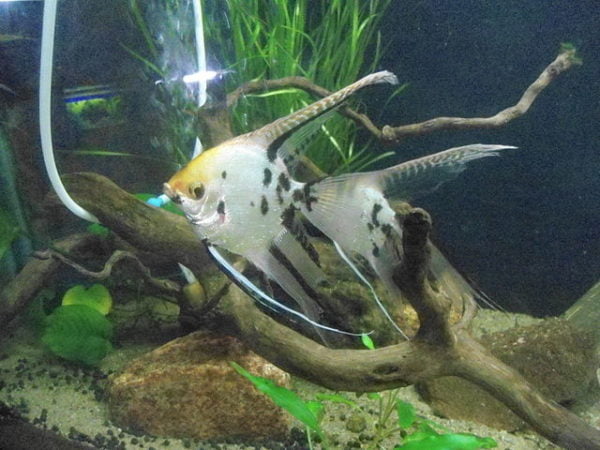
Fish, like humans, may be territorial. Angelfish are also quite picky about their territory, to the point that they keep track of the plants and rocks inside their designated areas. So, if you’ve made any alterations to the aquarium, your pet will likely become irritated and decrease its appetite.
The simplest solution to fix the problem and get your Angelfish to feed appropriately is to return the aquarium to its original state.
Aggressive Fish
Even though Angelfish can be territorial and aggressive, they prefer to avoid conflict with other fish species and avoid fighting with them. Your pet fish will become stressed if you place another fish species in its area or pull at its fins. You may see it miss a few meals as a result.
It’s usually a good idea to do some research about the fish you wish to put in your aquarium. If the fish you wish to maintain in the aquarium isn’t compatible with the other fish in the tank, you’re unintentionally inflicting your pet tension and discomfort.
Following is a list of fish that will do well with your Angelfish:
- German Blue Ram Cichlids
- Kribensis Cichlids
- Kuhli Loach
- Lemon Tetras
- Swordtails
- Dwarf Gourami
- Runny Nose Tetras
- Guppies
- Keyhole Cichlids
- Corydoras Catfish
- Bristlenose Pleco
Pregnant Angelfish
Angelfish do not reproduce. This phrase is solely used to describe livebearers. However, they become gravid, which means they develop and carry eggs in their bodies before depositing them. Of course, this only applies to ladies!
Gravid fish frequently lose their appetite at the conclusion of their pregnancy. This is perfectly normal and causes no concern.
If you fear your fish will lay eggs, transport her to a different tank where she will feel safer and more at ease. The water parameters in the new tank should, of course, match those in the previous tank.
What Can I Do To Get My Angelfish To Eat?
If your angelfish stop eating, you must do everything possible to get them to resume eating. It won’t be simple, and you may need to seek guidance from your veterinarian, but you may take steps to improve the aquarium’s circumstances. These are some of them:
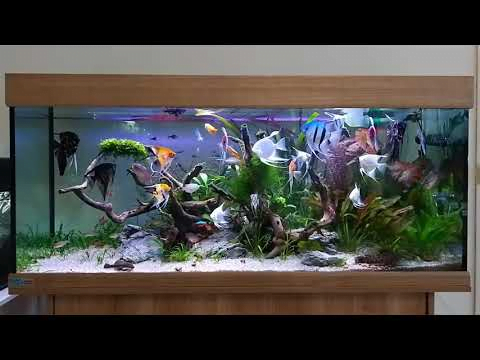
Stressors Must Be Removed
Remove any stressors from the tank to reduce your fish’s stress and prevent them from losing their appetite. Chemicals like ammonia and nitrites, decomposing plants and food, and aggressive fish are all examples. Add extra plants or aesthetic elements to the tank if there aren’t enough to provide hiding spaces.
Change Up The Diet
If you’ve been feeding your fish the same food for a long time, try changing it and seeing how they react. You could discover that your fish requires a simple switch to solve the problem. If they respond well, change their meal once or twice a week to keep them engaged.
Similarly, alternate between frozen and fresh meals to get a greater range of sensations. Provide live meals for your fish to hunt if you’re able. This provides optimal nourishment and stimulates the mind, reducing stress.
Feed The Appropriate Amount
It’s difficult to give your angelfish the appropriate quantity of food. When you under or overfeed your fish, some fish in your tank will become malnourished. Consequently, your fish are not refusing to eat because they can’t get to the food in the tank.
To guarantee that all your fish have a fair opportunity, simply give them enough food to consume in two minutes.
Reset the Boundaries
Reset the territory if you’re dealing with dominating angelfish, stressing out the lesser fish, and preventing them from feeding. This entails relocating the plants and ornamental elements within the tank.
It can sometimes be beneficial to re-establish borders and allow weaker fish to establish their region. If the situation worsens after you’ve done this, return some of the things to their original locations.
When fish stop eating, it’s understandably unpleasant, but in some situations, simply altering their living surroundings is enough to restore their appetites. Something is wrong if it lasts more than a day. Before your fish dies, take them to the vet for skilled care.
Can Angelfish Go For Extended Periods Without Eating?
Adult angelfish may go three days without eating if they are in good health. Young angelfish do not fare as well, surviving for only a day or two.
Angelfish in the wild are accustomed to going without food for several days. This is because they must hunt and forage for food, and food does not appear daily.
This specie, on the other hand, should not go too long without feeding. They will grow violent and attack each other if there is food scarcity. This may result in harm. Angelfish become sluggish, sickly, and pale as a result of malnutrition. They may eat other fish in the aquarium or fry to survive in the most extreme circumstances.
Video:
FAQs
Why are my angelfish not eating and hiding in corners?
An angelfish not eating and hiding in the corner means the fish is stressed and scared. Now, the reasons behind stress and fear can be many. It can be mean tankmates, poor water, and so on.
Why won’t my angelfish eat flake food?
The possible reason behind angelfish not eating flake food is that it simply doesn’t like its taste. Or maybe they’re not a fan of eating at the surface. Try switching the flake food’s brand or give something that sinks like pellets.
How many pellets should I feed my angelfish?
Younger angelfish should eat 3 to 4 times a day, according to common norms. Cut back on the meals and keep to a rigid regimen after they’ve reached full size.
Reference:

Annette M. Chaney is an experienced marine biologist with over 20 years of experience as an aquarist and fishkeeper. She started her first aquarium at a young age, filling it with frogs and goldfish obtained from the ten-cent pet store.
Annette grew up caring for and breeding African Cichlids, which led to a hobby in high school that doubled as a profitable means. Attending Reed College gave her time to solidify herself as an accomplished aquarium caretaker with an eye for sales. After that, from 2009 – 2013, she studied at Roger Williams University – one of the most prestigious universities for Aquaculture and Aquarium in USA. She is the founder of AquariumCircle since 2010.
